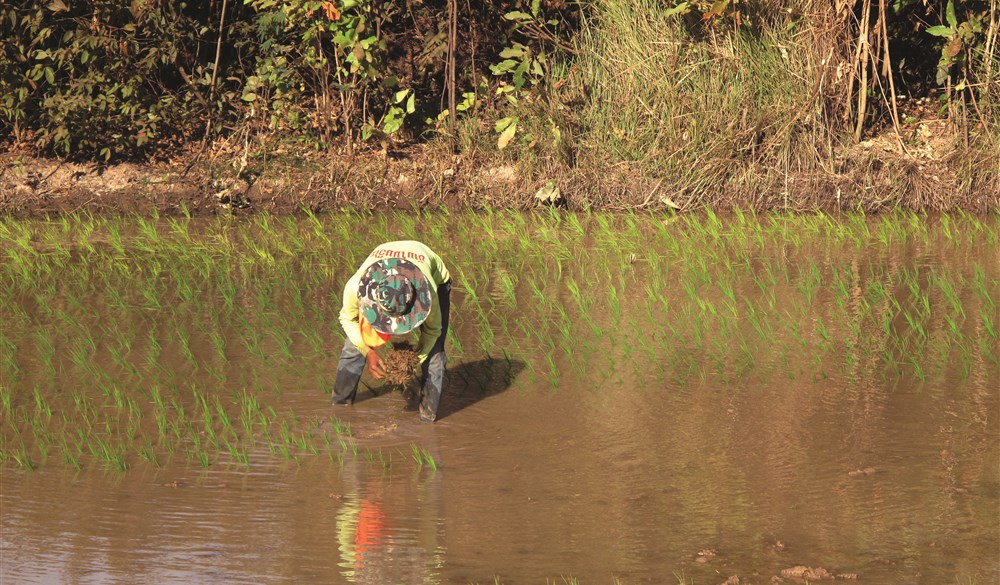Good Globalization
Story

Cuso alumnus leads students at one BC college in helping rice farmers in Laos
Cuso International volunteers are remarkable people. Take Nick Robinson for example. In 1978, Nick, his wife Gail and the couple’s infant daughter set off on a two-year volunteer placement in Papua New Guinea, three years after the country achieved independence from Australia. Nick worked in the civil service where he facilitated a smooth transition as the nationals took up positions in the administration. Nick relished his volunteer experience. “There was this feeling of being out there to change the world,” he remembers.
Thirty-six years later, Nick reconnected with Cuso International to offer a unique learning opportunity for his students at North Island College in British Columbia where Nick teaches business and economics. His most popular course is Globalization and International Business, which offers students a unique opportunity to dig into real-life work that makes an impact.
Every semester, students in Globalization and International Business investigate export opportunities for participating businesses. “I wanted to add a practical element to the course so students gain hands-on experience in the field,” explains Nick. In 2014, Nick’s class took on the export of rice from Laos to Canada through an e-volunteering partnership with Cuso International. The class project focused on the work of smallholder farmers who primarily produce rice, mainly for subsistence. The overall goal of the project was to explore opportunities for farmers to export their rice to Canada and other countries around the world. As well as providing students with a sizable challenge, this project had the potential to boost the income and improve the lives of farmers and their families on the other side of the world.
For the 10-week project, Nick assigned jobs to each student according to their interests, strengths, preferences and backgrounds. Student Hollie Shewfelt says she initially felt overwhelmed by the broad scope of the project. Through the research conducted by her group of four students, Hollie cultivated expertise on rice distribution, while keeping focused on what the farmers in Laos wanted to achieve. When it came to providing information, Hollie says Cuso International was very helpful. “They helped us focus on what we needed to do in Canada to help the farmers in Laos increase production and find a market,” she says.
The farmers in Laos produce a sticky, glutinous variety of rice that is not commonly found in Canada. In their research, Hollie’s group investigated two questions: whether there was a market for sticky rice in Canada, and whether the Laotian farmers could produce rice varieties for which there is demand, such as jasmine rice. Their research revealed that organically produced and certified rice can be sold for a higher price than rice that isn’t, making organic rice an attractive prospect for farmers. The next step was to learn how the farmers could export their product to Canada. Hollie approached four Canadian distributors with questions about organic rice, packaging and export regulations. Of the four distributors, the general manager of one emailed Hollie with a list of answers to her questions.
Hollie and her group shared their findings with Tim Straker-Cook, who is Cuso International’s Country Representative for Laos, and has been working with Nick and the students on this project. Tim says the student e-volunteers have contributed tremendous value and knowledge to the efforts of his team in Laos. “We wouldn’t have had the time, resources or expertise to conduct such in-depth analysis of various elements of the rice supply chain on our own,” says Tim. “They pointed us in the right direction as to where market opportunities are.”
Large scale projects like this one don’t take off overnight. When the class concluded at the end of 2014, Hollie and her cohort moved on, but the experience left a lasting impression. “I went from hoping to get an ‘A’ in the course to working on a real project that could really influence lives,” says Hollie. Through e-volunteering, Hollie discovered the impact she could have with just a laptop and an internet connection. “Who knew that a woman on Vancouver Island could help a farmer in a community on the other side of the world?” she says. “It’s phenomenal that the opportunity even exists.”
For their part, Nick and Tim are still working together, brainstorming project development ideas and models to equip Laotian rice farmers with the information they need to produce enough high quality, certified rice to distribute internationally.
Nick believes that educational institutions make good partners for non-governmental organizations (NGOs) like Cuso International. Although the goals of each organization differ slightly, the strengths that each partner brings form a powerful symbiotic relationship. “The efforts of Cuso International volunteers help to improve living standards, strengthen social cohesion and give people more control over their lives,” says Nick. “Our work supports those goals for farmers in Laos.”
As the world becomes ever more connected, it becomes easier to contribute to international development. E-volunteering makes it possible for skilled volunteers to conduct research, design information technology or websites, and many other ways of providing support to on-the-ground organizations – without even needing a passport!
“We can use globalization for good,” says Nick. “Let’s use it to lift millions of people out of poverty.”